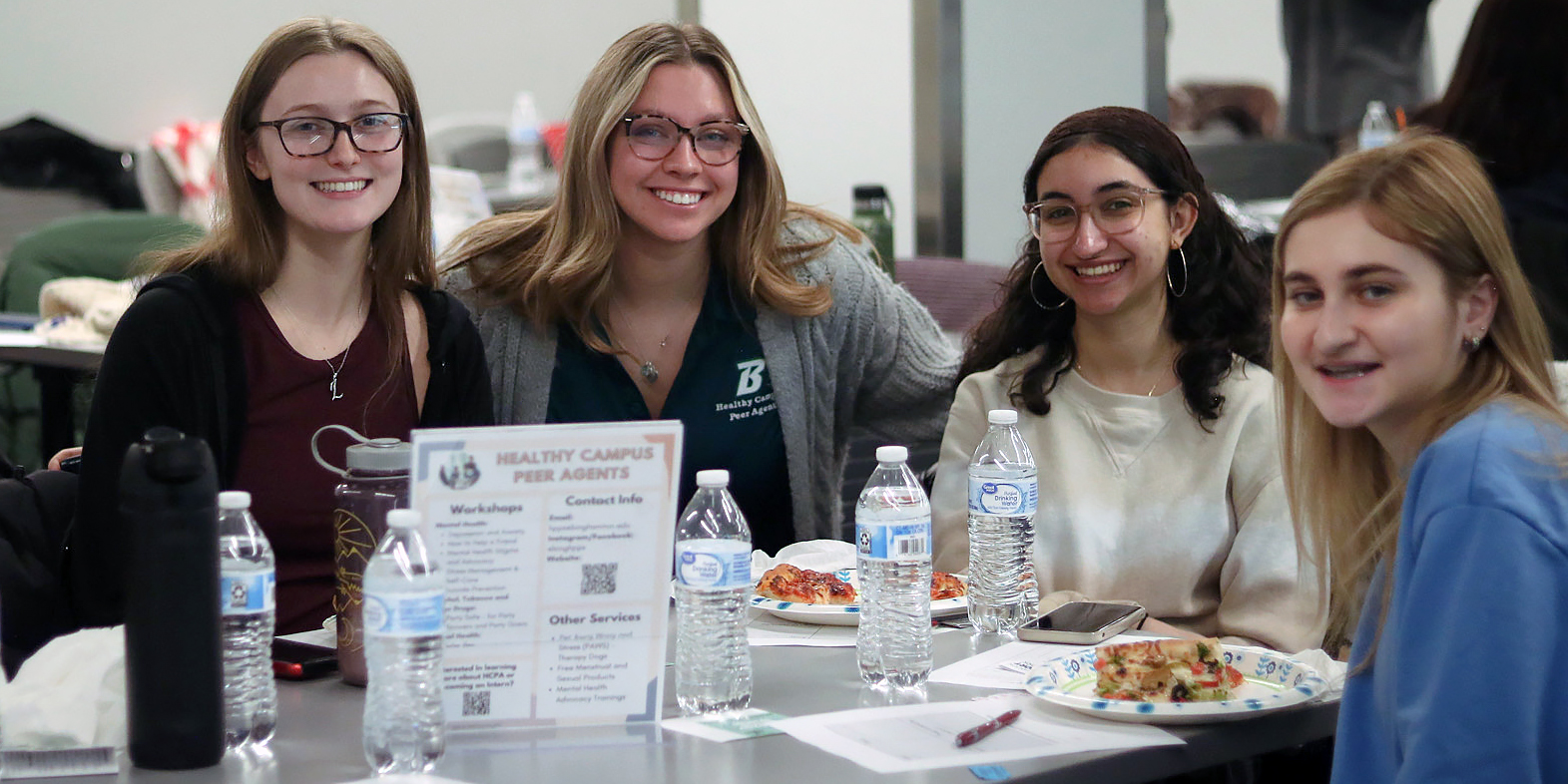Student advocates bring awareness to mental health resources

Rates of anxiety and depression in college students have skyrocketed since the beginning of the COVID-19 pandemic — a troubling trend with no obvious solutions. But for Binghamton University’s Healthy Campus Peer Agents, big changes start with individual efforts.
On Feb. 5, the Healthy Campus Peer Agents (HCPA) held a Mental Health Advocacy Training in the Hinman Multipurpose room. The half-day session was designed to educate students about the supportive resources available to them on campus, and to decrease stigma around discussing mental health. The ideal outcome of Mental Health Advocacy Training is a butterfly effect: by educating a small group of students, they will tell their friends about mental health resources, who will pass the information further, and so on.
HCPA interns Maya Homa and Michael Bianco coordinated this semester’s first training session, hoping to jumpstart the spread of information about mental health services at Binghamton.
“Being part of HCPA, you have to learn about all the resources available on campus,” said Bianco, a senior social work major with a minor in education. “It’s mandatory for us. But regular students don’t have an incentive to learn that. Even teaching just 10 to 20 people, they can take what they learn from us and branch out.”
“The goal is to have students become experts,” agreed Homa, a senior studying psychology. “This way, we’re building another layer of advocates within our community.”
Last year, Bianco and Homa worked as interns for M-HOPE, a campus initiative raising student awareness of mental health strategies and self-care. This year, M-HOPE combined with other campus initiatives (Alcohol, Tobacco and Other Drugs, and Real Education About College Health) to form HCPA, an internship program under the Health Promotion and Prevention Services Department. By uniting advocates from these separate areas of expertise, HCPA aims to take a more comprehensive approach to student well-being.
The Mental Health Advocacy Trainings are a regular fixture of HCPA’s programming, and will likely be held two to three more times this semester. The frequency can be attributed to a strong student interest in mental health topics — around 100 students attended the training on Feb. 5, and more who were not able to attend expressed interest.
During the training, the students participated in exercises designed to facilitate honest conversations about mental well-being. One activity involved students writing down three things they feared, and then re-framing the fears as a positive or neutral presence in their life. Another activity taught students how to notice warning signs of suicidal thoughts in peers.
“You could see it passing over all their faces — a sort of ‘aha’ moment,” Bianco said. “You could see them realizing that they should definitely know these things.”
When they aren’t holding training sessions, interns including Homa and Bianco serve as peer educators and role models, sharing their knowledge of campus resources.
“You learn to be the bridge between your peers and the resources they need,” Bianco said. “You get them the information they need to make their own choices.”
Depending on a student’s needs, clinical support is available at the University Counseling Center and through Decker Student Health Services Center’s psychiatry department. A myriad of non-clinical support networks are also in place, such as the CARE Team and the SEEK Student Helpline, which assist students with their concerns in a non-judgmental environment. If general support isn’t in-depth enough for specific needs, there are also dedicated assistance groups for issues including food insecurity (Binghamton University Food Pantry), interpersonal conflict resolution (Ombudsman) and addiction (Campus Recovery Support Group). All of these groups are waiting with open doors, but they can’t help students who don’t know they exist.
They also won’t be able to help if students are too ashamed to reach out. With events like the Mental Health Advocacy Training, Homa and Bianco want to help build a more supportive environment on campus. Open discussion builds transparency and lessens shame around mental health struggles, and the more students that they can reach with educational programs, the stronger Binghamton’s peer support network will become.
“I really believe this kind of event makes a difference,” Homa said. “You’ll be able to recognize symptoms in other people and play a bigger role in breaking down barriers keeping people from seeking help.”
Even though the training’s specific focus was on student mental well-being at Binghamton University, for Homa and Bianco, the importance of the training lies in the long-term skills students will take away.
“There’s a range of people in that room, and you don’t know where they’re going to end up personally or professionally,” Homa said. “Just with this background alone, they’ll have the training they need to have important conversations in the workplace.”
“You develop interpersonal skills,” Bianco agreed. “You can listen in an empathetic and active way to other people. Those aspects translate to all parts of life.”

